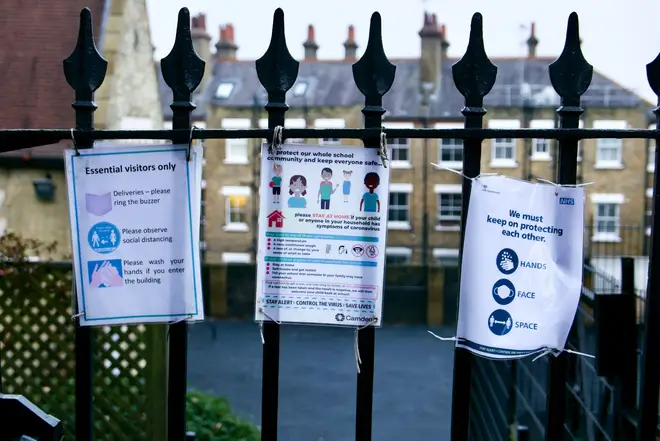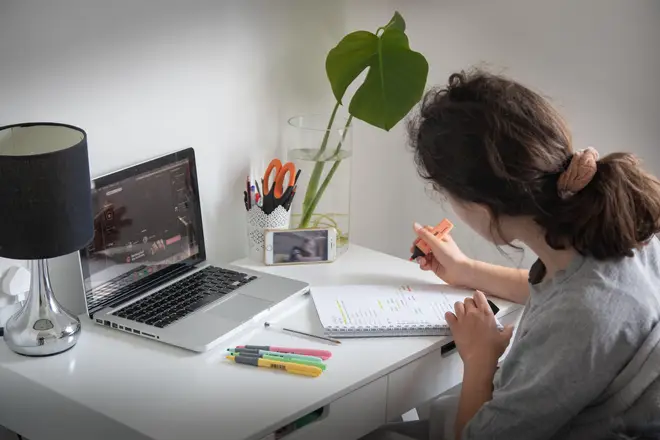
Clare Foges 6pm - 9pm
1 September 2021, 22:30 | Updated: 2 September 2021, 00:43

The Government’s education response during Covid has been branded as “not good enough” as analysis revealed the UK had the second longest school closures in Europe.
The UK's schools and universities spent 44 per cent of days between January 2020 and July 2021 in complete closure, according to Labour's analysis of data on the coronavirus response in the UK.
The only European country to fare worse was Italy, where schools were closed 48 per cent of the time.
Ireland was 10th on the list, with schools closed just 29 per cent of the time.
Read more: People aged 12 and over with weakened immune systems to get third Covid vaccine dose
Read more: Gavin Williamson warns pupils not to get 'carried away' when schools return
Labour accused Education Secretary Gavin Williamson of a slew of failures, with shadow education secretary Kate Green saying: "The Conservatives' failure to respond to the Covid crisis has kept kids out of class for far longer than their European counterparts.
"As the new school year starts, Gavin Williamson is again burying his head in the sand, ignoring the advice of scientific experts and risking creating a climate of chaos for schools if Covid rates rise."

'Good reason' to vaccinate children 12 and over, says virologist
Geoff Barton, general secretary of the Association of School and College Leaders, said the analysis showed the Government had "by any measure fallen short of what was needed".
"Its decision-making has too often been ponderous, its guidance has lacked clarity, and it has had a tendency to double down on flawed policy decisions before having to perform U-turns," he said.
Read more: First patient gets Pfizer's anti-Covid pill designed to stop coronavirus replicating
Read more: Mu: New Covid strain designated variant of interest by WHO
"It has not supported schools and colleges adequately during this period and has left them shouldering far too many responsibilities which are public health rather than education tasks."
The analysis, using data from Oxford University's Covid-19 response tracker, did not take into account time periods of expected closure such as school holidays.

Hundreds of thousands of pupils are returning to the classroom this week to a relaxation of safety measures that had been keeping coronavirus rates under control.
Schools and colleges in England no longer have to keep pupils in year group "bubbles" to reduce mixing, face coverings are no longer advised and isolation rules have been relaxed.
Head teachers' unions have warned this could lead to rising infections among school-aged children.
Read more: Govt intends to press on with vaccine passport plans for nightclubs
"The best way to minimise disruption to children's education and keep them in the classroom is to keep Covid cases low," said Paul Whiteman, general secretary of school leaders' union NAHT.
He said that the removal of bubbles and isolation requirements intended to stop children missing school could have the opposite effect if it results in more pupils catching coronavirus.
"The Government has chosen to remove many of the mitigations that were in place in schools last year, and it has done very little to look to replace these with alternative safety measures," he said.
Read more: Scotland to introduce vaccine passports for nightclubs and large events
Read more: Teenage Covid victim branded 'Satan' by anti-vaxxers for telling youngsters to get jab
"If an increase in cases means more children getting ill, lost learning could actually increase for many."
He accused the Government of simply "hoping for the best", a strategy he said was "not good enough".
"At the very least [the Government] must ensure that we have a properly functioning test and trace system that parents can have confidence in, a quick and effective public health response should additional mitigations be required in some schools, and support for schools to improve ventilation wherever needed," said Mr Whiteman.

Should pupils be paying £9,000 for just online learning, minister?
A Department for Education spokesperson described the research from Labour as "misleading" as education is a devolved matter and the UK Government is only responsible for overseeing it in England.
They added: "Education remains a national priority, and the success of the vaccine programme means schools and colleges will deliver high-quality, face-to-face education to their pupils this year, with minimal disruption.
"We have also committed to an ambitious education recovery plan, including an investment to date of over £3bn and a significant expansion of our tutoring programme, to support children and young people to make up for learning lost during the pandemic."